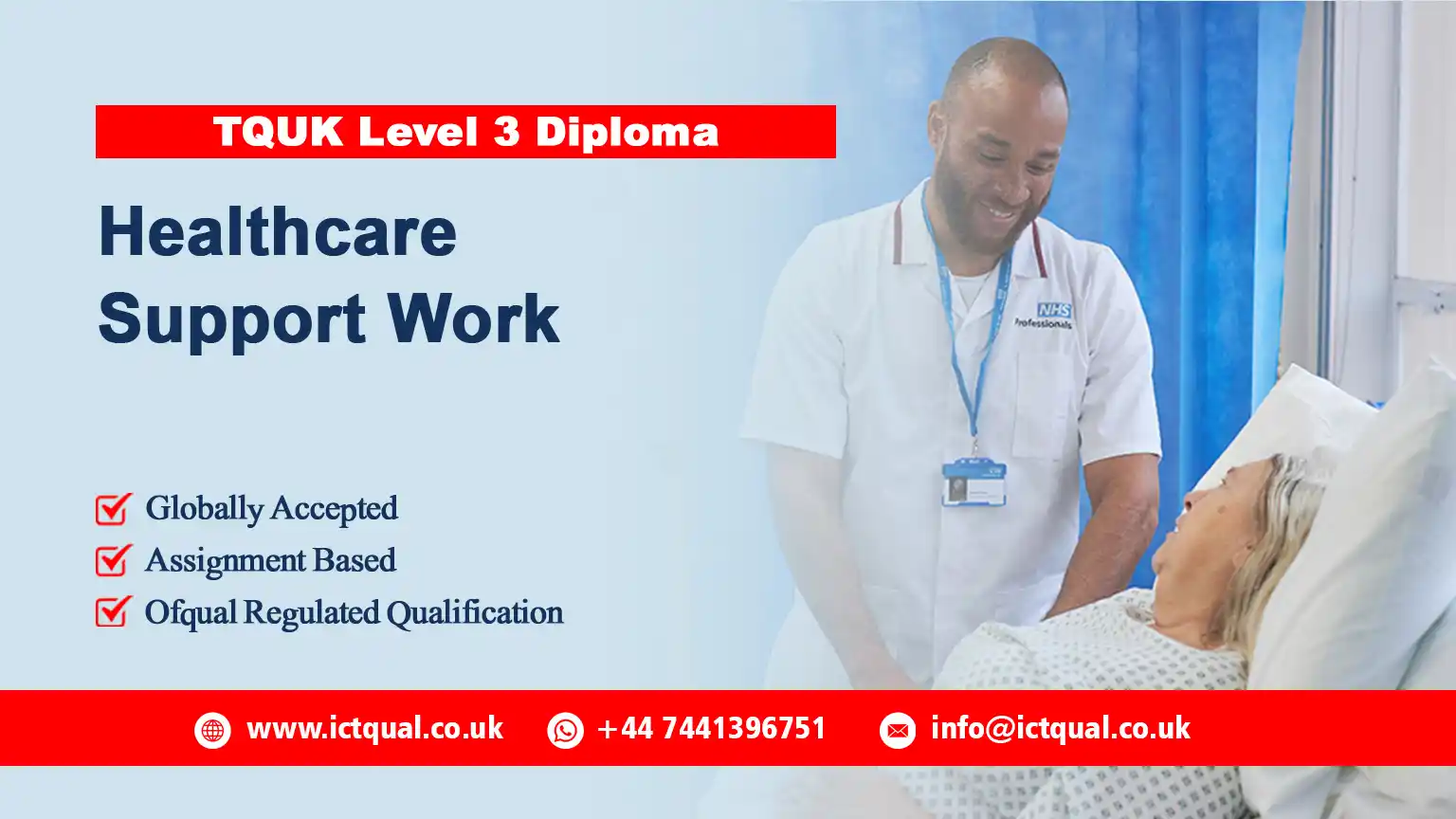In the dynamic field of healthcare, skilled support staff are crucial to delivering high-quality patient care and ensuring smooth operations within medical facilities. The TQUK Level 3 Diploma in Healthcare Support Work offers an exceptional opportunity for individuals seeking to enhance their careers in healthcare support roles.
This qualification, accredited by Training Qualifications UK (TQUK) and regulated by the Regulated Qualifications Framework (RQF), is designed to provide a comprehensive understanding of the essential skills and knowledge needed for effective healthcare support.
The TQUK Level 3 Diploma in Healthcare Support Work is an advanced qualification tailored for individuals who are already working in or aspiring to enter healthcare support roles. It is designed to provide a thorough understanding of the responsibilities and skills required to support healthcare professionals in delivering patient care.
The diploma covers a range of topics from clinical skills to communication and healthcare management, ensuring that learners are well-equipped to contribute effectively to patient care and support within various healthcare settings.
Achieving the TQUK Level 3 Diploma in Healthcare Support Work can significantly enhance career prospects by providing formal recognition of advanced skills and knowledge. Graduates are well-prepared for more senior roles within healthcare teams, such as Senior Healthcare Assistants, Clinical Support Coordinators, and Healthcare Administrators. The diploma also provides a strong foundation for further professional development and specialization in areas such as patient care management, clinical practice, and healthcare administration.
The TQUK Level 3 Diploma in Healthcare Support Work is a valuable qualification for those seeking to advance their careers in healthcare support. By providing comprehensive training in clinical skills, patient communication, healthcare management, and ethical practices, this diploma equips individuals to excel in their roles and make significant contributions to patient care and healthcare service delivery.
Whether you are looking to enhance your current role, pursue advanced opportunities, or specialize further in healthcare support, this qualification offers the expertise and recognition needed to achieve your professional goals and thrive in the dynamic field of healthcare.
Embark on a fulfilling career path where you can truly make a positive impact in the lives of others. Enroll in the TQUK Level 3 Diploma in Healthcare Support Work today and take the first step towards a brighter future. Your journey to professional growth, personal fulfillment, and meaningful contribution awaits – seize the opportunity now!
The TQUK Level 3 Diploma in Healthcare Support Work (RQF) is a pivotal qualification designed for individuals aiming to advance their careers in healthcare support roles. Accredited by Training Qualifications UK (TQUK) and regulated by the Regulated Qualifications Framework (RQF), this diploma is structured to provide a comprehensive understanding of the essential skills and knowledge required to excel in various healthcare settings.
The diploma offers a robust curriculum that addresses both theoretical knowledge and practical skills crucial for high-quality healthcare support. Participants will delve into advanced clinical support skills, learning how to assist healthcare professionals in delivering complex patient care. This includes mastering procedures such as taking vital signs, administering treatments, and effectively using medical equipment. The focus is on equipping learners with the competence to handle a diverse range of clinical tasks with precision and confidence.
Effective communication with patients and their families is central to quality healthcare. The TQUK Level 3 Diploma emphasizes the development of strong interpersonal skills, ensuring that learners can engage with patients compassionately and professionally. The course covers techniques for clear communication, addressing patient concerns, and providing emotional support, which are essential for improving patient experiences and outcomes.
In addition to clinical competencies, the diploma includes training in healthcare management and administration. Learners will gain insights into managing patient records, coordinating care activities, and understanding healthcare policies and procedures. This module prepares individuals to support the efficient operation of healthcare services, contributing to better organizational outcomes and streamlined patient care.
Maintaining high standards of health and safety is critical in any healthcare environment. The diploma incorporates comprehensive training on health and safety protocols, including infection control, emergency procedures, and safe handling of medical supplies. Learners will be adept at implementing and monitoring safety measures, ensuring a secure environment for both patients and healthcare staff.
The diploma also covers healthcare ethics and professionalism, addressing the importance of ethical decision-making and maintaining professional standards. Participants will explore issues such as confidentiality, informed consent, and professional conduct, ensuring that they adhere to legal and ethical standards in their practice.
To ensure that learners can effectively apply their knowledge, the TQUK Level 3 Diploma integrates practical exercises and real-world scenarios. The course is designed to offer flexibility, with options for classroom-based learning, online modules, and blended formats. This allows individuals to balance their studies with work and personal commitments, making the qualification accessible to a wide range of professionals.
The TQUK Level 3 Diploma in Healthcare Support Work is ideal for those seeking to enhance their career prospects in healthcare support roles. Graduates are prepared for advanced positions such as Senior Healthcare Assistants, Clinical Support Coordinators, and Healthcare Administrators. The diploma also provides a strong foundation for further specialization and professional development within the healthcare sector.
The TQUK Level 3 Diploma in Healthcare Support Work offers a thorough and practical training pathway for those aiming to advance their careers in healthcare support. By covering advanced clinical skills, patient communication, healthcare management, and ethical practices, this qualification equips learners to make significant contributions to patient care and healthcare service delivery. Whether you are looking to enhance your current role or pursue new opportunities within healthcare, this diploma provides the expertise and recognition needed to achieve your professional goals and excel in a rewarding and dynamic field.
The list below contains ALL mandatory units and optional units with total of 85 Credits Hours.
Below that, the available pathways are listed by specialism
Mandatory Units
| Sr# | Unit Title | Credit Hours |
|---|---|---|
| 1 | Assist in monitoring the health of individuals affected by health conditions | 2 |
| 2 | Cleaning, Decontamination and Waste Management | 2 |
| 3 | Communicate with individuals about health promotion and wellbeing | 3 |
| 4 | Maintain infection prevention and control in a care setting | 2 |
| 5 | Maintain quality standards in the health sector | 2 |
| 6 | Person-centred practice, choice, and independence | 6 |
| 7 | Promote health, safety, and wellbeing in care settings | 6 |
| 8 | Promote personal development in care settings | 3 |
| 9 | Promoting effective handling of information in care settings | 2 |
| 10 | Promoting equality and inclusion in care settings | 3 |
| 11 | Protection and Safeguarding in care settings | 3 |
| 12 | Providing support for managing pain and discomfort | 3 |
| 13 | Responsibilities of a senior healthcare worker | 3 |
| 14 | Service improvement within the health sector | 3 |
| 15 | Study Skills support for senior healthcare workers | 6 |
| 16 | Understand duty of care in care settings | 3 |
| 17 | Understand effective communication in care settings | 3 |
| 18 | Understanding Mental Ill Health | 4 |
| 19 | Undertake physiological measurements in care settings | 4 |
Optional Units
| Sr# | Unit Title | Credit Hours |
|---|---|---|
| A. Optional Units | ||
| 1 | Adapt and fit healthcare equipment, medical devices, assistive technology, or products to meet individuals needs | 6 |
| 2 | Administer medication to individuals and monitor the effects | 5 |
| 3 | Administer oral nutritional products to individuals | 4 |
| 4 | Advise and inform individuals on managing their condition | 5 |
| 5 | Anatomy and physiology for maternity support workers | 2 |
| 6 | Assist in and monitor the administration of oxygen | 4 |
| 7 | Assist in implementing treatment programmes for individuals with severely reduced movement mobility | 4 |
| 8 | Assist in receiving, handling, and dispatching clinical specimens | 2 |
| 9 | Assist in testing individuals’ abilities prior to planning physical activities | 5 |
| 10 | Assist in the administration and management of medication | 3 |
| 11 | Assist in the delivery of perioperative care and support of individuals | 4 |
| 12 | Assist in the implementation of programmes to increase mobility, movement, and functional independence | 4 |
| 13 | Assist others to plan presentations | 2 |
| 14 | Assist practitioners in carrying out health care activities | 3 |
| 15 | Awareness of mental health legislation | 3 |
| 16 | Build positive relationships with children and young people | 3 |
| 17 | Care for a newborn baby | 4 |
| 18 | Care for individuals with urethral catheters | 4 |
| 19 | Care for the older person | 2 |
| 20 | Caring for the physical and nutritional needs of babies and young children | 5 |
| 21 | Carry out blood collection from fixed or central lines | 4 |
| 22 | Carry out vision screening | 4 |
| 23 | Carry out wound drainage care | 4 |
| 24 | Collaborate in the assessment of environmental and social support in the community | 4 |
| 25 | Conduct intravenous cannulation | 6 |
| 26 | Conduct routine maintenance on clinical equipment | 4 |
| 27 | Conducting hearing assessments | 4 |
| 28 | Contribute to the care of a deceased person | 3 |
| 29 | Contribute to the safe use of medical devices in the perioperative environment | 4 |
| 30 | Coordinate individuals through care pathways | 3 |
| 31 | Deliver exercise sessions to improve individuals’ health and wellbeing | 5 |
| 32 | Deliver training through demonstration and instruction | 3 |
| 33 | Dementia Awareness | 2 |
| 34 | Develop and agree individualised care plans for babies and families | 5 |
| 35 | Effective communication with children and young people in care settings | 4 |
| 36 | Enable children and young people to understand their health and well-being | 5 |
| 37 | Enable individuals with behaviours that challenge to develop strategies to manage their behaviour | 8 |
| 38 | Give presentations to groups | 4 |
| 39 | Identify, collate and communicate health information to individuals | 2 |
| 40 | Implement hydrotherapy programmes for individuals and groups | 5 |
| 41 | Implement therapeutic group activities | 4 |
| 42 | Implement therapeutic group activities | 4 |
| 43 | Manage the use of physical resources in a health setting | 3 |
| 44 | Managing symptoms in end-of-life care | 4 |
| 45 | Measure and record individuals’ body fluid balance in a perioperative environment | 4 |
| 46 | Monitor and maintain the environment and resources during and after health care activities | 3 |
| 47 | Monitor individuals progress in relation to managing their body weight and nutrition | 3 |
| 48 | Move and position individuals ‘safely’ in accordance with their care plan | 4 |
| 49 | Notify an individual of discharge arrangements | 2 |
| 50 | Obtain a client history | 3 |
| 51 | Obtain and test capillary blood samples | 4 |
| 52 | Obtain venous blood samples | 3 |
| 53 | Perform first-line calibration on clinical equipment ensuring it is fit for use | 3 |
| 54 | Perform routine electrocardiograph (ECG) procedures | 4 |
| 55 | Prepare and apply dressings and drains to individuals in the perioperative environment | 2 |
| 56 | Prepare and dress for scrubbed clinical roles | 4 |
| 57 | Prepare and provide surgical instrumentation and supplementary items for the surgical team | 6 |
| 58 | Prepare and support individuals for healthcare activities | 3 |
| 59 | Prepare for, obtain and test specimens from individuals | 3 |
| 60 | Prepare the anaesthetic environment and provide support for pre and post operative anaesthesia and recovery | 5 |
| 61 | Prepare, insert and secure nasogastric tubes | 4 |
| 62 | Principles of health promotion | 2 |
| 63 | Provide advice and information to enable parents to promote the health and well-being of their newborn babies | 3 |
| 64 | Provide advice on foot care for individuals with diabetes | 4 |
| 65 | Provide agreed support for foot care | 3 |
| 66 | Provide information and advice to individuals on eating to maintain optimum nutritional status | 5 |
| 67 | Provide support for individuals with interaction and communication difficulties | 4 |
| 68 | Provide support for mobility | 2 |
| 69 | Provide support to individuals to continue recommended therapies | 3 |
| 70 | Receive and handle clinical specimens within the sterile field | 4 |
| 71 | Recognise indications of substance misuse and refer individuals to specialists | 4 |
| 72 | Remove wound closure materials | 3 |
| 73 | Remove wound drains | 4 |
| 74 | Reprocess endoscopy equipment | 4 |
| 75 | Safeguarding the wellbeing of children and young people | 7 |
| 76 | Select and wear appropriate personal protective equipment for work in healthcare settings | 2 |
| 77 | Support carers in meeting the care needs of individuals | 5 |
| 78 | Support children and young people with mental health conditions | 5 |
| 79 | Support independence in the tasks of daily living | 5 |
| 80 | Support individuals at the end of life | 6 |
| 81 | Support individuals during a period of change | 4 |
| 82 | Support individuals during emergency situations | 3 |
| 83 | Support individuals during the last days of life | 5 |
| 84 | Support individuals in managing continence | 3 |
| 85 | Support individuals in managing dysphagia | 5 |
| 86 | Support individuals in undertaking their chosen activities | 4 |
| 87 | Support individuals to access and use information about services and facilities | 3 |
| 88 | Support individuals to access and use services and facilities | 4 |
| 89 | Support individuals to carry out their own health care procedures | 2 |
| 90 | Support individuals to eat and drink | 2 |
| 91 | Support individuals to live at home | 4 |
| 92 | Support individuals to manage their own recovery from mental health conditions | 3 |
| 93 | Support individuals to meet personal care needs | 2 |
| 94 | Support individuals to retain, regain and develop skills for everyday life. | 4 |
| 95 | Support individuals undertaking healthcare activities | 3 |
| 96 | Support individuals who are bereaved | 4 |
| 97 | Support individuals who are distressed | 3 |
| 98 | Support individuals with cognition or learning difficulties | 5 |
| 99 | Support individuals with feeding babies | 4 |
| 100 | Support individuals with mental health conditions to change patterns of behaviour using coping strategies | 4 |
| 101 | Support individuals with specific communication needs | 5 |
| 102 | Support mental health service users and carers to manage change | 3 |
| 103 | Support parents or carers to interact with and care for their newborn baby | 4 |
| 104 | Support parents, carers and those in a parental role to care for babies during their first year | 5 |
| 105 | Support positive risk taking for individuals | 4 |
| 106 | Support the spiritual wellbeing of individuals | 3 |
| 107 | Support the surgical team when preparing individuals for operative and invasive procedures | 4 |
| 108 | Supporting children and young people experiencing transitions | 3 |
| 109 | Supporting children and young people with additional needs | 6 |
| 110 | Supporting individuals with speech and language disorders to develop their communication skills | 5 |
| 111 | Supporting positive behaviour | 6 |
| 112 | Supporting the care of individuals with nasogastric tubes | 3 |
| 113 | Transport, transfer and position individuals and equipment within the perioperative environment | 5 |
| 114 | Understand advance care planning | 3 |
| 115 | Understand care and support planning and risk management in mental health | 4 |
| 116 | Understand end-of-life care for individuals with specific health needs | 4 |
| 117 | Understand human structure and functionality | 3 |
| 118 | Understand long-term conditions and frailty | 3 |
| 119 | Understand mental health interventions | 4 |
| 120 | Understand mental health, wellbeing and behaviour management of children and young people | 3 |
| 121 | Understand planning and the practical application of health promotion | 2 |
| 122 | Understand suicide interventions | 6 |
| 123 | Understand the administration and management of medication | 3 |
| 124 | Understand the context of supporting individuals with learning disabilities | 4 |
| 125 | Understand the current legal, policy and service framework in mental health | 5 |
| 126 | Understand the impact and experience of dementia | 4 |
| 127 | Understand the importance of personal wellbeing & personal wellbeing when working in mental health services | 4 |
| 128 | Understand, prepare for and, carry out extended feeding techniques | 4 |
| 129 | Understanding effective communication and building relationships in mental health work | 6 |
| 130 | Understanding the development of children and young people | 4 |
| 131 | Understanding the effects of dementia on end-of-life care | 3 |
| 132 | Undertake agreed pressure area care | 4 |
| 133 | Undertake examinations of the feet of individuals with diabetes | 4 |
| 134 | Undertake external ear examinations | 4 |
| 135 | Undertake personal hygiene activities with individuals | 3 |
| 136 | Undertake stoma care | 4 |
| 137 | Undertake the non-scrubbed role for perioperative procedures | 4 |
| 138 | Undertake tissue viability risk assessments | 3 |
| 139 | Undertake treatments and dressings of wounds and lesions | 4 |
| 140 | Undertake urethral catheterisation | 4 |
| 141 | Work in partnership with families to support individuals | 3 |
| 142 | Working with babies and young children to support their development and learning | 5 |
| B. Adult Nursing Support – Clinical Care | ||
| 143 | Care for individuals with urethral catheters | 4 |
| 144 | Carry out blood collection from fixed or central lines | 4 |
| 145 | Conduct intravenous cannulation | 6 |
| 146 | Obtain and test capillary blood samples | 4 |
| 147 | Obtain venous blood samples | 3 |
| 148 | Remove wound closure materials | 3 |
| 149 | Undertake personal hygiene activities with individuals | 3 |
| 150 | Undertake stoma care | 4 |
| 151 | Undertake tissue viability risk assessments | 3 |
| 152 | Undertake treatments and dressings of wounds and lesions | 4 |
| C. Adult Nursing Support/Health Navigation | ||
| 153 | Obtain a client history | 3 |
| 154 | Support individuals to access and use services and facilities | 4 |
| D. Adult Nursing Support/Elderly Care | ||
| 155 | Care for the older person | 2 |
| 156 | Support individuals at the end of life | 6 |
| 157 | Support individuals during a period of change | 4 |
| E. Adult Nursing Support/Learning Disability Support | ||
| 158 | Support independence in the tasks of daily living | 5 |
| 159 | Understand the context of supporting individuals with learning disabilities | 4 |
| F. Adult Nursing Support/Community Support | ||
| 160 | Advise and inform individuals on managing their condition | 5 |
| 161 | Implement therapeutic group activities | 4 |
| 162 | Work in partnership with families to support individuals | 3 |
| G. Maternity Support | ||
| 163 | Care for a newborn baby | 4 |
| 164 | Caring for the physical and nutritional needs of babies and young children | 5 |
| 165 | Develop and agree individualised care plans for babies and families | 5 |
| 166 | Manage the use of physical resources in a health setting | 3 |
| 167 | Provide advice and information to enable parents to promote the health and well-being of their newborn babies | 3 |
| 168 | Support individuals with feeding babies | 4 |
| 169 | Support parents or carers to interact with and care for their newborn baby | 4 |
| 170 | Support parents, carers and those in a parental role to care for babies during their first year | 5 |
| 171 | Supporting children and young people with additional needs | 6 |
| H. Theatre Support | ||
| 172 | Assist in the delivery of perioperative care and support to individuals | 4 |
| 173 | Contribute to the safe use of medical devices in the perioperative environment | 4 |
| 174 | Measure and record individuals’ body fluid balance in a perioperative environment | 4 |
| 175 | Prepare the anaesthetic environment and provide support for pre and post operative anaesthesia and recovery | 5 |
| 176 | Support the surgical team when preparing individuals for operative and invasive procedures | 4 |
| 177 | Transport, transfer and position individuals and equipment within the perioperative environment | 5 |
| 178 | Undertake the non-scrubbed role for perioperative procedures | 4 |
| I. Mental Heath Support | ||
| 179 | Awareness of mental health legislation | 3 |
| 180 | Enable individuals with behaviours that challenge to develop strategies to manage their behaviour | 8 |
| 181 | Recognise indications of substance misuse and refer individuals to specialists | 4 |
| 182 | Support children and young people with mental health conditions | 5 |
| 183 | Support individuals to manage their own recovery from mental health conditions | 3 |
| 184 | Support individuals with mental health conditions to change patterns of behaviour using coping strategies | 4 |
| 185 | Support mental health service users and carers to manage change | 3 |
| 186 | Support positive risk taking for individuals | 4 |
| 187 | Understand care and support planning and risk management in mental health | 4 |
| 188 | Understand mental health interventions | 4 |
| 189 | Understand mental health, wellbeing and behaviour management of children and young people | 3 |
| 190 | Understand suicide interventions | 6 |
| 191 | Understand the current legal, policy and service framework in mental health | 5 |
| 192 | Understand the importance of personal wellbeing & personal wellbeing when working in mental health services | 4 |
| 193 | Understanding effective communication and building relationships in mental health work | 6 |
| J. Children and Young Peoples Support | ||
| 194 | Build positive relationships with children and young people | 3 |
| 195 | Caring for the physical and nutritional needs of babies and young children | 5 |
| 196 | Effective communication with children and young people in care settings | 4 |
| 197 | Enable children and young people to understand their health and well-being | 5 |
| 198 | Support children and young people with mental health conditions | 5 |
| 199 | Supporting children and young people experiencing transitions | 3 |
| 200 | Supporting children and young people with additional needs | 6 |
| 201 | Understand How to Safeguard the Wellbeing of Children and Young People. | 3 |
| 202 | Understand mental health, wellbeing and behaviour management of children and young people | 3 |
| 203 | Understanding the development of children and young people | 4 |
| 204 | Working with babies and young children to support their development and learning | 5 |
| K. Allied Health Professional Therapy Support | ||
| 205 | Assist in implementing treatment programmes for individuals with severely reduced movement mobility | 4 |
| 206 | Assist in the implementation of programmes to increase mobility, movement, and functional independence | 4 |
| 207 | Assist others to plan presentations | 2 |
| 208 | Deliver exercise sessions to improve individuals’ health and wellbeing | 5 |
| 209 | Deliver training through demonstration and instruction | 3 |
| 210 | Give presentations to groups | 4 |
| 211 | Emplement hydrotherapy programmes for individuals and groups | 5 |
| 212 | Monitor individuals progress in relation to managing their body weight and nutrition | 3 |
| 213 | Principles of health promotion | 2 |
| 214 | Provide agreed support for foot care | 3 |
| 215 | Provide information and advice to individuals on eating to maintain optimum nutritional status | 5 |
| 216 | Provide support for individuals with interaction and communication difficulties | 4 |
| 217 | Provide support for mobility | 2 |
| 218 | Support individuals in undertaking their chosen activities | 4 |
| 219 | Supporting individuals with speech and language disorders to develop their communication skills | 5 |
| 220 | Undertake examinations of the feet of individuals with diabetes | 4 |
| 221 | Contribute to the discharge of individuals to carers | 2 |
| 222 | Contribute to the effectiveness of teams | 2 |
The TQUK Level 3 Diploma in Healthcare Support Work caters to individuals aspiring to build a career in the healthcare sector as support workers. It appeals to:
- Those genuinely interested in delivering care and assistance to patients within diverse healthcare settings.
- Individuals aiming to acquire the essential knowledge and competencies required for effective performance as healthcare support workers across a range of healthcare environments, including hospitals, clinics, residential care facilities, and community settings.
- Aspiring healthcare professionals seeking a comprehensive grasp of healthcare systems, patient care principles, and ethical considerations inherent in the healthcare field.
- Individuals looking to make an entry into the healthcare domain or transition from related roles into healthcare support positions.
- Those desiring to pursue further education or advance their careers in healthcare, as this diploma serves as a robust foundation for subsequent studies or specialization within the healthcare industry.
Upon successful completion of the TQUK Level 3 Diploma in Healthcare Support Work (RQF), learners will be able to:
- Demonstrate Proficiency in Clinical Support Skills:
- Learners will acquire advanced clinical skills essential for supporting healthcare professionals in patient care. They will be adept at performing complex procedures, such as monitoring vital signs, assisting with treatments, and using medical equipment effectively. This proficiency ensures that they can handle a variety of clinical tasks with confidence and contribute significantly to patient care.
- Apply Effective Communication Techniques:
- Effective communication is crucial in healthcare. Graduates will develop strong interpersonal skills, enabling them to interact clearly and empathetically with patients and their families. They will be skilled in conveying complex medical information, addressing patient concerns, and providing emotional support, which enhances patient experiences and fosters trust within the healthcare setting.
- Implement Healthcare Management Practices:
- Learners will be equipped to manage and coordinate healthcare activities efficiently. They will gain knowledge in handling patient records, organizing care routines, and adhering to healthcare policies and procedures. This expertise ensures smooth operation within healthcare facilities and supports effective care delivery and administrative functions.
- Adhere to Health and Safety Regulations:
- Understanding and implementing health and safety protocols is essential for maintaining a safe environment. Graduates will be well-versed in infection control practices, emergency procedures, and the safe handling of medical supplies. They will be capable of monitoring and upholding safety standards to protect both patients and healthcare staff.
- Apply Ethical and Professional Standards:
- Learners will understand and apply ethical principles and professional standards in their practice. This includes respecting patient confidentiality, obtaining informed consent, and maintaining professional behavior. Graduates will be prepared to navigate ethical dilemmas and ensure that their practice aligns with legal and ethical requirements.
- Handle Complex Patient Care Scenarios:
- Graduates will be capable of managing complex patient care situations effectively. They will use their problem-solving skills and clinical knowledge to address diverse patient needs and contribute to positive health outcomes. This competency is crucial for providing high-quality care and supporting healthcare teams in challenging scenarios.
- Utilize Healthcare Information Systems:
- Learners will gain proficiency in using healthcare information systems and technology. This includes managing electronic health records, utilizing data for decision-making, and ensuring the effective use of digital tools. Their ability to navigate healthcare technology will support efficient administrative and clinical functions.
- Demonstrate Leadership and Teamwork:
- The diploma will prepare learners to take on leadership and coordination roles within healthcare teams. They will demonstrate skills in managing team activities, supporting collaborative efforts, and contributing to the overall effectiveness of healthcare services. This leadership capability is vital for advancing within healthcare support roles.
- Engage in Continuous Professional Development:
- Graduates will be encouraged to pursue ongoing professional development to enhance their skills and knowledge. They will be equipped to seek further specialization and stay updated with advancements in the healthcare field. This commitment to continuous learning supports career growth and adaptation in a dynamic healthcare environment.
- Support Patient-Centered Care:
- Learners will understand the principles of patient-centered care and be able to implement these principles in their practice. They will focus on providing care that respects patients’ preferences, needs, and values, ensuring that patient care is tailored to individual requirements and enhancing overall patient satisfaction.
These learning outcomes ensure that graduates of the TQUK Level 3 Diploma in Healthcare Support Work are well-prepared to excel in their roles, contribute effectively to patient care, and advance their careers in the healthcare sector.







